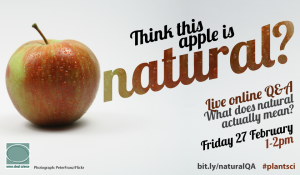Organic agriculture – should science or ideology guide our decisions?

The Plant Science Panel Q&A entitled ‘What does natural actually mean’ over on Sense About Science is well worth a read. In particular I direct your attention to Question 3 regarding organic agriculture.
There are a variety of movements, production systems, practices, and disciplines being promoted as sustainable alternatives to the, broadly speaking, industrial agriculture we have today. Organic agriculture, Permaculture, Agroecology, Climate-Smart Agriculture, and Ecological Intensification are a few examples. I think the merits of any practices proposed by these ‘systems’ should be determined through rigorous scientific scrutiny. This is often complicated if a system has not been well defined, or if it is unclear exactly which practices conform to a particular system – a criticism some would have over climate-smart agriculture and agroecology.
Thankfully there are many scientists and other specialists whose analysis of these issues is well worth considering and the Plant Science Q&As are an excellent example. Here is a few excerpts of what the experts had to say regarding organic agriculture:
“…I feel there is insufficient awareness of the absolute necessity of having to dramatically increase the unit area productivity of our major crops in order to feed the world’s growing population, which is something that organic farming cannot deliver.”
“…organic growers often take other actions to help protect against disease, but if disease gets hold, it becomes very difficult to eradicate and can lead to crop failures. Can you imagine the impact on our food security if the whole wheat or potato crop failed because we couldn’t control the spread of a devastating disease? This is what spurred the Irish potato famine and I for one don’t want to return to days like that. So for me, sustainable agriculture is about reaching a balance between cost and production required to meet the demands of the population. If this could be achieved organically – I’m sure most would support it. Unfortunately it can’t.”
“….the rules governing organic farming prevent the aims being achieved. This is because the rules involve blanket bans on entire categories of things, such as all “artificial chemical fertilisers” or any crop variety produced using GM. This cannot possibly be consistent with the aim of delivering the best in environmental protection. If environmental protection is the driver, then that alone should dictate what is and what is not allowed [emphasis mine], and this obviously requires evidence for the specific agro-ecosystem in question.”
The ability of organic agriculture to achieve the yields necessary to feed the world has been called into doubt as has it’s ability to cope with disease. Some would also argue that organic agriculture, being made up of “blanket bans”, is an ideology. Instead of being focused on the desired outcome, organic agriculture seems caught up in an ideology that says what is and is not allowed to achieve that outcome. But as one expert notes, “If environmental protection is the driver, then that alone should dictate what is and what is not allowed”.
The significance of the above statement should not be dismissed. Only a rigorous scientific investigation on a case by case basis can enlighten us as to the merits (environmental or otherwise) of a particular practice/method/technique/input. This is something also seen in the whole GM debate. Instead of focusing on the trait, EU legislation is obsessed with the technique that elucidated the trait. Whereas in Canada they regulate according to the trait in question, regardless of the technique used to create it.
Perhaps there is a risk that the alternative systems I mentioned at the beginning could also move in this direction. Organic agriculture has clearly demonstrated certain benefits but is held back by dogma and an unscientific analysis. My point is that supporters of a particular alternative for sustainable agriculture should think hard about what the desired outcome of the system is and be aware that no single approach will safely feed the planet. Then let scientific evidence determine which means are most appropriate for achieving the desired outcome.
Note
Regarding Genetically Modified Plants, take a look at the following;
2016 Report by The National Academy of Sciences, Engineering, and Medicine – Genetically Engineered Crops: Experiences and Prospects
Royal Society Animation explaining the science of GM
2016 Royal Society Q&A on GM Plants